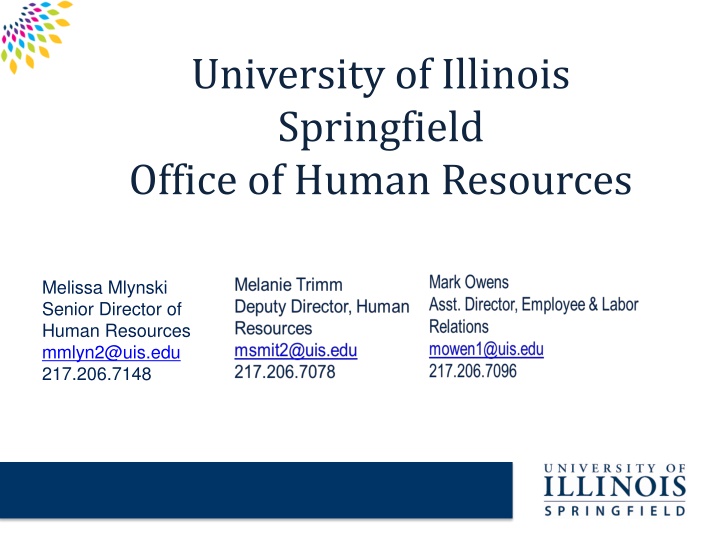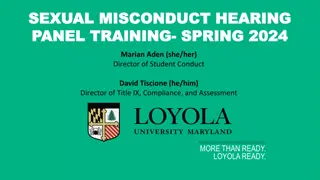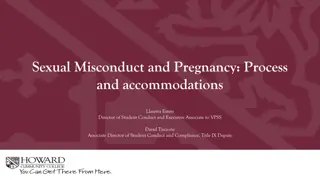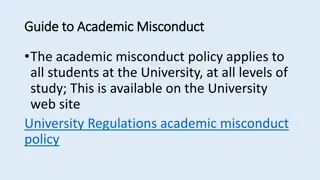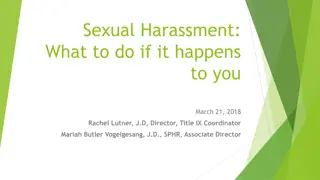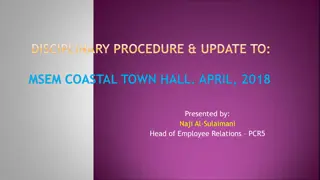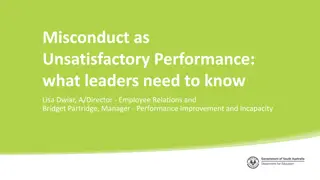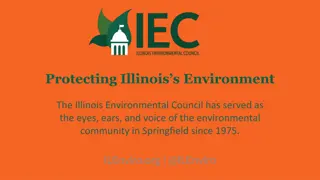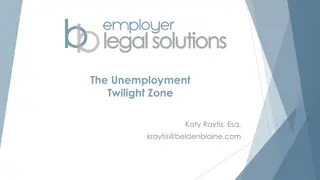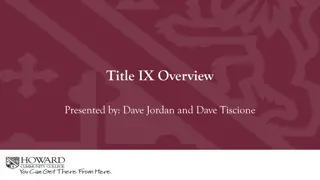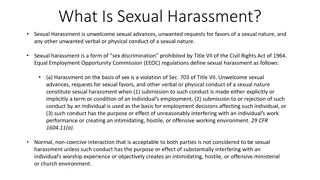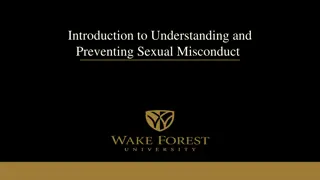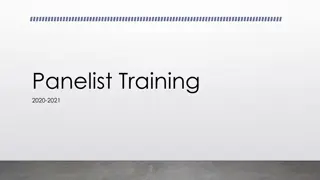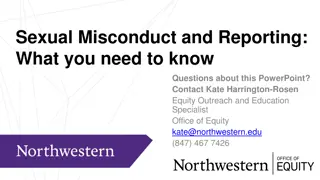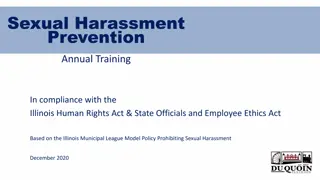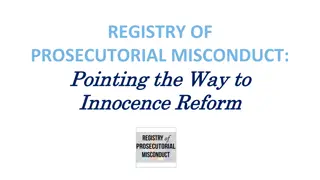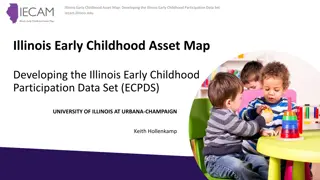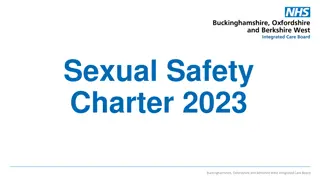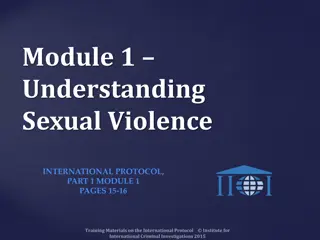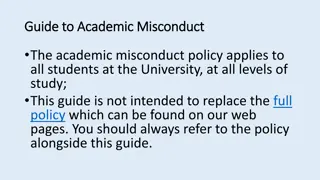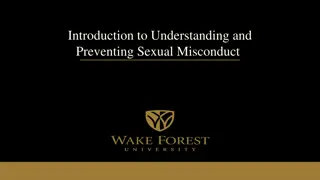University of Illinois Springfield New System-wide Policies on Sexual Misconduct
The University of Illinois Springfield introduces new system-wide policies on sexual misconduct, including considerations for prior employment and workplace-related intimate personal relationships. These policies stemmed from recommendations by a task force and were initiated in response to the need for tighter regulations and background checks. Effective from September 17, 2020, these policies aim to uphold a safe and respectful work environment across the university campuses.
Uploaded on Sep 28, 2024 | 0 Views
Download Presentation

Please find below an Image/Link to download the presentation.
The content on the website is provided AS IS for your information and personal use only. It may not be sold, licensed, or shared on other websites without obtaining consent from the author.If you encounter any issues during the download, it is possible that the publisher has removed the file from their server.
You are allowed to download the files provided on this website for personal or commercial use, subject to the condition that they are used lawfully. All files are the property of their respective owners.
The content on the website is provided AS IS for your information and personal use only. It may not be sold, licensed, or shared on other websites without obtaining consent from the author.
E N D
Presentation Transcript
University of Illinois Springfield Office of Human Resources Melissa Mlynski Senior Director of Human Resources mmlyn2@uis.edu 217.206.7148
Two new System-wide policies Policy on Consideration of Sexual Misconduct in Prior Employment Policy on Workplace-Related Intimate Personal Relationships 1
Origins of Policies A System-wide Task Force on Sexual Misconduct & Prevention, comprised of faculty, staff and students from across the universities, made a series of recommendations to the BOT. Recommendations included the creation of new policies that would restrict faculty/staff and student relationships and require background checks for sexual misconduct in hiring. Committees with representatives from the three universities and the System Office were formed to develop the policies. 2
Effective dates Both policies approved by Board of Trustees May 21, 2020. Implemented system-wide September 17, 2020. 3
Policy on Consideration of Sexual Misconduct in Prior Employment, page 1 The Policy and the UIS Procedures implementing the policy are available on the UIS HR website. 4
Policy on Consideration of Sexual Misconduct in Prior Employment, page 2 Allows the University to inquire and requires the candidate to disclose whether a candidate for employment has been found to have engaged in Sexual Misconduct or Sexual Harassment in the course of prior employment. Candidate may be removed from consideration or a contingent offer of employment withdrawn if warranted based on prior findings of misconduct. Offer of employment will be withdrawn if candidate refuses to cooperate with the policy. Applicable to all Civil Service, Academic Professional, Non-Tenured and Tenure/Tenure Track Faculty vacancies. 5
Policy on Consideration of Sexual Misconduct in Prior Employment, page 3 Findings means a documented conclusion that an individual has engaged in Sexual Misconduct or Sexual Harassment, resulting from an official investigation or adjudicative process not subsequently reversed through a formal review process. Official investigations include, but are not limited to: Any investigation of alleged Sexual Misconduct conducted pursuant to Title IX of the Education Amendments of 1972 ( Title IX ); Any investigation of Sexual Harassment by the office responsible for making findings regarding allegations of sexual harassment or sexual misconduct, or the office responsible for determining sanctions for such conduct. Allegations are not documented Findings for purposes of this policy unless and until they are substantiated through an official investigation or adjudicative process. 6
Policy on Consideration of Sexual Misconduct in Prior Employment, page 4 Sexual Misconduct and Sexual Harassment will be defined to include: 1. Conduct that would violate university policies and procedures, including the System and University policies on Sexual Misconduct and Sexual Harassment, as they may be modified from time to time; and 2. Conduct that violates current or former employer s policies concerning Sexual Misconduct or Sexual Harassment, or the equivalent. 7
Policy on Consideration of Sexual Misconduct in Prior Employment, page 5 Applicants will be notified of new policy. Requires final candidate disclosure and authorization to release information from prior employers after they have accepted a contingent offer of employment. Applicable to internal candidates. 8
Policy on Consideration of Sexual Misconduct in Prior Employment, page 6 HR staff will check with prior employers and follow up on disclosures. This process will run concurrent with our current background check process. 9
Policy on Consideration of Sexual Misconduct in Prior Employment, page 7 Policy requires each University, Hospital and the System office to transmit final disposition Sexual Misconduct or Sexual Harassment Findings to the System Human Resources Office. System Office HR will maintain data base and UIS HR staff will check for final candidates who work or have worked within the System. 10
Policy on Consideration of Sexual Misconduct in Prior Employment, page 8 Factors that will be considered in the event of a finding: The nature and severity of the conduct at issue; When and under what circumstances the conduct occurred; Whether the conduct involved an abuse of power or authority, such as involvement of subordinate employees or students; The nature of the position for which the candidate is being considered; The candidate s subsequent conduct and work history; Evidence of rehabilitation. Per UIS procedures, Senior Director of HR will make recommendation to the Division Head on whether it is in the best interest of the University to withdraw a contingent offer of employment. 11
Questions? UIS HR contact for questions on Sexual Misconduct in Prior Employment Policy and Procedures: Melanie Trimm msmit2@uis.edu 12
Policy on Workplace-Related Intimate Personal Relationships, page 1 Important links Policy FAQs UIS Procedures Reporting Form Brief information video coming soon! 13
Policy on Workplace-Related Intimate Personal Relationships, page 2 Applies to all Faculty, Staff and Students within the University of Illinois System Intended to address the actual or apparent conflict of interest resulting from particular types of workplace-related intimate personal relationships. Prohibits certain relationships and requires the creation of a Conflict Management Plan for other relationships. 14
Policy on Workplace-Related Intimate Personal Relationships, page 3 The system-wide policy is intended to minimize risk from relationships with unequal institutional authority. To help minimize this risk, the policy sets forth guidelines on when employees are required to disclose that they are in an intimate relationship with another employee or student at the university. Any information that is submitted is treated as confidential and is only shared with appropriate staff on a need to know basis (like supervisors). 15
Policy on Workplace-Related Intimate Personal Relationships, page 4 Intimate Personal Relationship defined: Any relationship of a sexual, amorous, dating, or romantic nature. This definition will be applied based upon the nature, not the duration, of the relationship. Any contact of a sexual, amorous, dating, or romantic nature would be considered an Intimate Personal Relationship under this policy even if it does not recur. 16
Policy on Workplace-Related Intimate Personal Relationships, page 5 This is what Faculty, Teaching Assistants, Staff, and Individuals with Authority need to know: 1. Intimate Relationships Involving Direct or Indirect Supervisory or Evaluative Authority Prohibited 2. Any Intimate Relationships Between Faculty or Staff and Undergraduate Students Prohibited 3. Relationships Between Teaching Assistants and Students Prohibited when they have a direct or indirect Supervisory or Evaluative Authority 4. Relationships Between Faculty or Staff and Graduate/Professional Students - prohibited from entering into an Intimate Personal Relationship with any Graduate/Professional Student over whom they have direct or indirect Supervisory or Evaluative Authority 17
Policy on Workplace-Related Intimate Personal Relationships, page 6 EXCEPTIONS: 1. Relationships Existing Before the Effective Date of This Policy The prohibitions above do not apply to Intimate Personal Relationships in existence prior to the effective date of this Policy. However, ongoing relationships that would violate this Policy if entered into on or after the effective date of this Policy must be reported 2. Other Exceptions Individuals may request an exception from the above. The relevant University, System Offices or Hospital will consider exceptions on a case-by-case basis. Any approved exception will require the development of a conflict management plan 18
Policy on Workplace-Related Intimate Personal Relationships, page 7 UIS Reporting Procedures: Employees shall utilize the online Reporting Form to report a new intimate personal relationship, or an ongoing personal relationship that existed before implementation of the Policy, if the relationship could potentially violate the policy. The individual who holds a position with supervisory or evaluative authority is required to complete the report. In the event of a faculty/staff relationships with a student, the faculty/staff have the obligation to report. Human Resources will determine whether or not: the relationship is prohibited under the Policy, an exception can be granted, and/or a Conflict Management Plan is necessary. The Employee is responsible for alerting Human Resources to any changes in employment position or job duties and responsibilities while the relationship is ongoing that may impact the HR determination. 19
Policy on Workplace-Related Intimate Personal Relationships, page 8 Submission and Review Process per UIS Procedures: 1. Employee (Person A) completes the Reporting Form and submits it to uishr@uis.edu 2. Human Resources reviews the form and informs the other party (Person B) that a report has been made. 3. Human Resources contacts necessary individuals, which can include (but is not limited to) Person A and Person B to gather more information and to determine whether or not: the relationship is prohibited under the Policy, an exception can be granted, and/or a Conflict Management Plan (CMP) is necessary. 20
Policy on Workplace-Related Intimate Personal Relationships, page 9 Submission and Review Process continued: 4. form electronically to Person A for signature. If a CMP is necessary, Human Resources completes the CMP form and routes the 5. Person A s unit head for signature. After Person A signs CMP, the form is routed to Person A s supervisor and then to 6. Human Resources will have the final signature on the CMP. 7. necessary signatures, is provided to Person A and Person B. Human Resources will ensure that a final copy of the CMP, containing all the 21
Policy on Workplace-Related Intimate Personal Relationships, page 10 Appeal Process in the event HR makes a determination with which Person A disagrees: Person A may submit a written request for reconsideration to the Division Head. The request should include all relevant information Person A would like considered in the reevaluation. The Division Head may need to contact Human Resources or additional individuals to evaluate the request for reconsideration. 22
Policy on Workplace-Related Intimate Personal Relationships, page 11 PERIODIC REVIEW: Human Resources reserves the right to periodically review the CMP to ensure compliance and to determine whether or not updates need to be made to the CMP. 23
Policy on Workplace-Related Intimate Personal Relationships, page 12 Consequences for Violations of this Policy If any individual violates the terms of this Policy, disciplinary action will be taken in accordance with relevant disciplinary procedures contained in the relevant statutes, handbooks, policies, procedures, practices, or contracts. Any disciplinary action taken will be commensurate with the nature of the violation and will consider factors and circumstances relevant to each specific case. Disciplinary action for violations of this policy can include, but are not limited to, written warnings, loss of privileges, mandatory training or counseling, probation, suspension, demotion, exclusion, expulsion, discharge, and termination of employment, including revocation of tenure. 24
QUESTIONS? UIS HR contact for questions on the Workplace-Related Intimate Personal Relationships Policy or Procedure: Mark Owens mowen1@uis.edu 25
